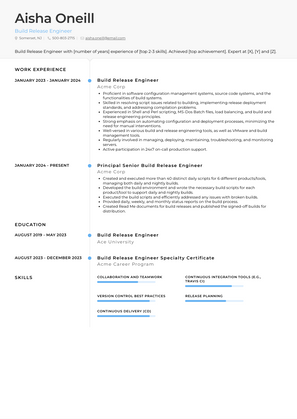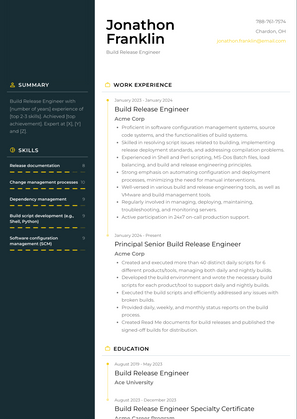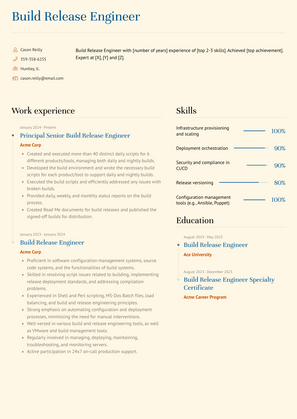Build Release Engineer Resume Examples and Templates
This page provides you with Build Release Engineer resume samples to use to create your own resume with our easy-to-use resume builder. Below you'll find our how-to section that will guide you through each section of a Build Release Engineer resume.



What do Hiring Managers look for in a Build Release Engineer Resume
- Build and Release Automation: Proficiency in setting up and automating build and release pipelines using tools like Jenkins, Travis CI, or GitLab CI/CD.
- Version Control Systems: Knowledge of version control systems (e.g., Git) and their integration with build processes.
- Scripting and Coding Skills: Proficiency in scripting languages (e.g., Shell, Python) and the ability to write automation scripts for deployment and release processes.
- Problem-Solving Abilities: Aptitude for troubleshooting build and release issues and finding solutions to improve the efficiency of the release process.
- Collaboration: Effective communication and collaboration with development and operations teams to ensure smooth and reliable software releases.
How to Write a Build Release Engineer Resume?
To write a professional Build Release Engineer resume, follow these steps:
- Select the right Build Release Engineer resume template.
- Write a professional summary at the top explaining your Build Release Engineer’s experience and achievements.
- Follow the STAR method while writing your Build Release Engineer resume’s work experience. Show what you were responsible for and what you achieved as a Build Release Engineer.
- List your top Build Release Engineer skills in a separate skills section.
How to Write Your Build Release Engineer Resume Header?
Write the perfect Build Release Engineer resume header by:
- Adding your full name at the top of the header.
- Add a photo to your resume if you are applying for jobs outside of the US. For applying to jobs within the US, avoid adding photo to your resume header.
- Add your current Build Release Engineering position to the header to show relevance.
- Add your current city, your phone number and a professional email address.
- Finally, add a link to your portfolio to the Build Release Engineer resume header. If there’s no portfolio link to add, consider adding a link to your LinkedIn profile instead.
Bad Build Release Engineer Resume Example - Header Section
Belinda 7600 W. Bay Meadows Avenue Rochester, NY 14606 Marital Status: Married, email: cooldude2022@gmail.com
Good Build Release Engineer Resume Example - Header Section
Belinda Thompson, Rochester, NY, Phone number: +1-555-555-5555, Link: linkedin/in/johndoe
Make sure to add a professional looking email address while writing your resume header. Let’s assume your name is John Doe - here is a formula you can use to create email addresses:
- firstnamelastname@email.com - johndoe@email.com
- firstname.lastname@email.com - john.doe@email.com
- lastname.firstname@email.com - doe.john@email.com
- f.lastname@email.com - j.doe@email.com
- l.firstname@email.com - d.john@email.com
- firstnamelastname12@email.com - johndoe12@email.com
For a Build Release Engineer email, we recommend you either go with a custom domain name (john@johndoe.com) or select a very reputed email provider (Gmail or Outlook).
How to Write a Professional Build Release Engineer Resume Summary?
Use this template to write the best Build Release Engineer resume summary: Build Release Engineer with [number of years] experience of [top 2-3 skills]. Achieved [top achievement]. Expert at [X], [Y] and [Z].
How to Write a Build Release Engineer Resume Experience Section?
Here’s how you can write a job winning Build Release Engineer resume experience section:
- Write your Build Release Engineer work experience in a reverse chronological order.
- Use bullets instead of paragraphs to explain your Build Release Engineer work experience.
- While describing your work experience focus on highlighting what you did and the impact you made (you can use numbers to describe your success as a Build Release Engineer).
- Use action verbs in your bullet points.
Principal Senior Build Release Engineer Resume Example
Principal Senior Build Release Engineer
- Created and executed more than 40 distinct daily scripts for 6 different products/tools, managing both daily and nightly builds.
- Developed the build environment and wrote the necessary build scripts for each product/tool to support daily and nightly builds.
- Executed the build scripts and efficiently addressed any issues with broken builds.
- Provided daily, weekly, and monthly status reports on the build process.
- Created Read Me documents for build releases and published the signed-off builds for distribution.
Build Release Engineer Resume Example
Build Release Engineer
- Proficient in software configuration management systems, source code systems, and the functionalities of build systems.
- Skilled in resolving script issues related to building, implementing release deployment standards, and addressing compilation problems.
- Experienced in Shell and Perl scripting, MS-Dos Batch files, load balancing, and build and release engineering principles.
- Strong emphasis on automating configuration and deployment processes, minimizing the need for manual interventions.
- Well-versed in various build and release engineering tools, as well as VMware and build management tools.
- Regularly involved in managing, deploying, maintaining, troubleshooting, and monitoring servers.
- Active participation in 24x7 on-call production support.
Top Build Release Engineer Resume Skills for 2023
- Build and release engineering
- Software configuration management (SCM)
- Version control systems (e.g., Git, SVN)
- Build automation
- Continuous integration (CI)
- Continuous delivery (CD)
- Release management
- Build script development (e.g., Shell, Python)
- Source code branching and merging
- Build server configuration (e.g., Jenkins, TeamCity)
- Artifact repository management (e.g., Nexus, Artifactory)
- Dependency management
- Build pipeline design
- Release planning
- Deployment automation
- Release versioning
- Code integration and validation
- Build performance optimization
- Release documentation
- Version control best practices
- Build process improvement
- Build validation and testing
- Build release coordination
- Release rollback procedures
- Environment configuration management
- Continuous integration tools (e.g., Travis CI)
- Configuration management tools (e.g., Ansible, Puppet)
- Containerization (e.g., Docker, Kubernetes)
- Infrastructure as code (IaC)
- DevOps principles and practices
- Cloud deployment (e.g., AWS, Azure)
- Continuous integration and delivery pipelines
- Build artifact signing and verification
- Change management processes
- Deployment orchestration
- Build and release metrics and KPIs
- Security and compliance in CI/CD
- Release planning tools (e.g., JIRA)
- Release automation tools (e.g., Chef, Ansible)
- Deployment rollback strategies
- Release communication
- Infrastructure provisioning and scaling
- Configuration management databases (CMDB)
- Test environment management
- Presentation and communication skills
- Problem-solving abilities
- Collaboration and teamwork
- Time management and organization
- Adaptability and flexibility
- Documentation and reporting
How Long Should my Build Release Engineer Resume be?
Your Build Release Engineer resume length should be less than one or two pages maximum. Unless you have more than 25 years of experience, any resume that’s more than two pages would appear to be too long and risk getting rejected.
On an average, for Build Release Engineer, we see most resumes have a length of 2. And, that’s why we advise you to keep the resume length appropriate to not get rejected.
Copyright ©2025 Workstory Inc.
